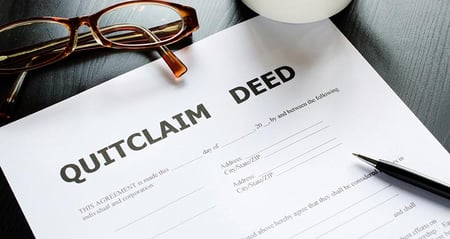 If you're behind on your mortgage and desperate to avoid foreclosure, you may find yourself searching for any and all ways, no matter how obscure, that you could improve your situation.
If you're behind on your mortgage and desperate to avoid foreclosure, you may find yourself searching for any and all ways, no matter how obscure, that you could improve your situation.
Could there be a way to get a free house through the statute of limitations or a quiet title action, or would suing your lender benefit you in some way? We've covered all of those topics on this blog before.
How about a quitclaim deed? Could that you could make your mortgage problems go away?
What Is a Quitclaim Deed?
A quitclaim deed is a way for someone to transfer interest in real property and quit their ownership claim to it. The party transferring ownership is called a grantor, and the party receiving ownership is called the grantee.
Quitclaim deeds are easy. All that is needed to execute a quitclaim deed is for both parties to sign the agreement, get it notarized, and file it.
However, “a quitclaim deed contains no title covenant and thus offers the grantee no warranty as to the status of the property title.” The grantee gets whatever the grantor owns at the time the transfer happens, but the grantor doesn't guarantee that they own the property or that the title is free and clear. So the grantee might receive no interest in the property, and a quitclaim deed does not come with any warranty.
There are other types of deeds used for real estate sales, like a warranty deed, that contain warranties about title and encumbrances against the title.
Quitclaim deeds are sometimes mistakenly called 'quickclaim deeds'.
When Is A Quitclaim Deed Used?
Since there's no warranty with a quitclaim deed, it is often used to transfer property between family members, add someone's name to a title, or in special circumstances, including the following:
Divorce
If a married couple owns a home together, during their divorce they can execute a quitclaim deed for one spouse to terminate their interest in their property, giving a full claim to the home to the other.
However, while a quitclaim deed transfers ownership, it doesn't relieve the grantor of their debt obligations for the property. That remains. A refinance, which pays off the old mortgage and creates a new one, is the only way to get former spouse off of your mortgage.
Probate
Probate is a legal process heirs have to go through to settle a deceased person's debt and determine who gets their property. Probate involves filing a petition with the probate court in the county and state where the deceased lived or owned property. At the end of the process the executors of the estate will be established by the courts.
The heirs who want to keep a home they're entitled to through probate will need to record a quitclaim deed, which transfers interest in the property to them.
Deed in lieu of foreclosure
A deed in lieu of foreclosure is an agreement to give your home to the bank in exchange for canceling the mortgage. It can be a good option for people who have defaulted on their mortgage and don't want to keep their home. A quitclaim will need to be signed and recorded to complete the deed in lieu agreement.
This is not an option that is available any time you want it. You have to apply for a deed in lieu of foreclosure with your loan servicer. The application requires the homeowner to submit documentation of their income and finances, including W-2s, income tax statements, and more.
So, a quitclaim deed is used in some situations where a homeowner is in or at risk of foreclosure, but it can't stop foreclosure on its own. You need a real strategy to do that.
If your goal is to keep your home following a default, a loan modification is your best bet. A loan modification will allow you to reinstate your loan with modified terms, which could include a less expensive monthly payment and reduced principal. If you don't want to keep your home, you could try to get approved for a short sale or cash for keys agreement.
 It's a good idea to have an attorney representing you while you're fighting to save your home or exit it gracefully, not only to get you what you want, but also to help you avoid foreclosure for long enough to have a chance pursue those options.
It's a good idea to have an attorney representing you while you're fighting to save your home or exit it gracefully, not only to get you what you want, but also to help you avoid foreclosure for long enough to have a chance pursue those options.
Applications for loan modifications, for example, are frequently denied, and it takes time to reapply. You can find yourself drowning in paperwork when applying and reapplying.
There are a number of foreclosure defenses, such as lack of standing or failure of condition precedent, that can be used to prolong the foreclosure process, stop a sale date, and hold the banks accountable to get you everything you're entitled to.
There is no magic bullet that stops foreclosure. A quitclaim deed on its own will not keep you out of foreclosure, but it does come into play in several scenarios where foreclosure is a risk. There are many resources online, including this blog, that you can use to educate yourself and make the best decision for your situation.
Image courtesy of Sira Anamwong at FreeDigitalPhotos.net










